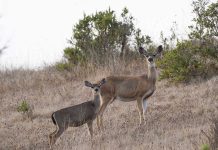
A green car with new tires makes its way straight down the track at full speed, reaching 100 mph. At an approaching sharp corner the driver eases up, allowing his car to zip smoothly through the corner as a trailing blue car tries to catch up.
These cars will never be seen at NASCAR or Formula One racing: they’re slot cars.
Slot car racing is back in Morgan Hill with a new track in place at Andy’s Hobby shop, 17511 Monterey Road. This 155-foot track with eight lanes is powered through 12 volts of electricity, with the cars controlled through hand held remote controls. The cars fit into the slots on the track and look like typical remote-control toy cars: plastic on top, motors inside with rubber wheels. But on the track, taking those sharp turns and flying through laps at high-speeds, there’s no questioning that these small versions more resemble race cars than toys.
There’s technique involved to taking those fast curves. Letting go of the button on the control a little slows down the car while completely releasing the button stops the car.
Where the green line is that’s where you give it the gas,” said Norm Fischer, pointing to the side of the track where a painted green line is marked. “Red is where you brake. You give it more gas on the straightaway, then let go on the curves.”
“It’s just like driving a real car,” said Andy Douglas, owner of Andy’s Hobby.
Douglas installed the new track several weeks ago and instated weekly Saturday races for those serious enough to try out.
“It was my hobby when I was a kid. You know how things are always making a comeback? Slot car racing is back in Morgan Hill,” said Douglas.
Douglas, originally from San Jose, began slot car racing when he was 8 years old in the 1960s. Now 55, he continues to race, bringing back the nostalgia. On the wall of the shop are some old photos of slot racing back in the 1960s as spectators watch racers and their cars speed through in the same similar, wide-eyed fashion that those do today.
“It’s for anyone from 4 to 104,” said Douglas. “Any family member can have fun.”
The weekly races on Saturday nights have gathered as many as 100 entries at once, packing Andy’s Hobby shop and causing Douglas to split up the cars into different divisions. Most serious racers bring their own cars, remote controls and ‘pit boxes’ filled with equipment to spruce up and maintain their race cars.
“There’s people that really get into this hobby … You would think they were Formula One teams,” said Douglas.
For Fischer, who’s lived in Morgan Hill since 1947, he said racing again brings back memories of racing in Morgan Hill when a slot car track was located across the street from where Andy’s Hobby is now.
“I started years ago and I came to see this track,” said Fischer, whose 45-year-old son also races. “I thought it would be fun.”
On one Friday afternoon, it was Fischer’s sixth time practicing on the track as he brought along friend Scott, who also raced as a child.
“I remember when I was a kid, my brother and I had a real nice one (car), I can picture it in my mind,” said Scott, who declined to give his last name. “It was a nice green color with these futuristic round bubbles.”
Scott said although it has been many years since he’s raced slot cars, not too many things have changed.
“The technology with the cars is so much faster. They were fast in the old days but they’ve come a long way, they’ve got faster motors and lighter cars. There’s more down force on the body on the car so they could go faster.”
Scott said he isn’t quite ready to participate in a Saturday race quite yet, “I have to do more things to the car before to make it competitive,” he said.
Racing for half an hour on the raceway track costs $8, entries for a race competition runs at $10 and participants can rent a car from the shop if they don’t have their own.
Purchasing one’s own competitive race car can cost anywhere from $20 to $200, the electric remote controls that run the cars themselves and plug into the side of the track, about $60.
“It’s easy to spend a lot of money on this,” said Fischer who owns two cars.
If not driven correctly, the race cars can lose control and fall off their slot on the track. During an actual race, when races are won by how many laps a car can complete in a given amount of time, getting off the slot can ruin your chances of winning, said Scott.
Laps are counted by a computer program that Douglas runs during races, displayed on a TV monitor above the raceway. The winner receives a small placard that Douglas had made, and of course, bragging rights.
No licenses are required to drive these car, a good thing for Rita Renteria who brought in her nephew and son, Jake Renteria, 12, and Michael Renteria, 14, to practice racing on a Friday afternoon.
“I’m surprised that it hasn’t gotten bigger here, I don’t think a lot of people know about it yet,” said Renteria. “Of course my husband and brother-in-law love this just as much as the kids!”
Rita herself had never seen slot racing before until one Saturday night dinner when the family was walking by Andy’s Hobby and peeked inside to see the racetrack that had overtaken the entire shop.
“I haven’t seen anything like this before,” she said.
Douglas said this new track in Morgan Hill is the only one in the Bay Area; another exists in Sacramento. He tried bringing in a track in San Jose a few years back yet high rent costs caused them to close it down.
“A lot of people that I used to race with from back in the day I see now in Morgan Hill,” said Douglas, who still races himself on the track. “It’s a hobby that’s brining everyone back together.”







